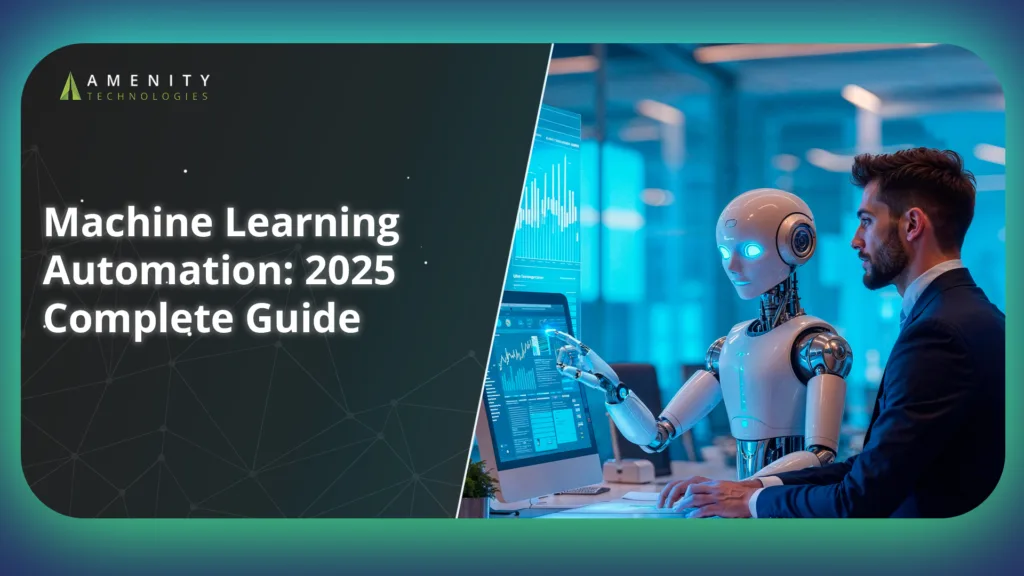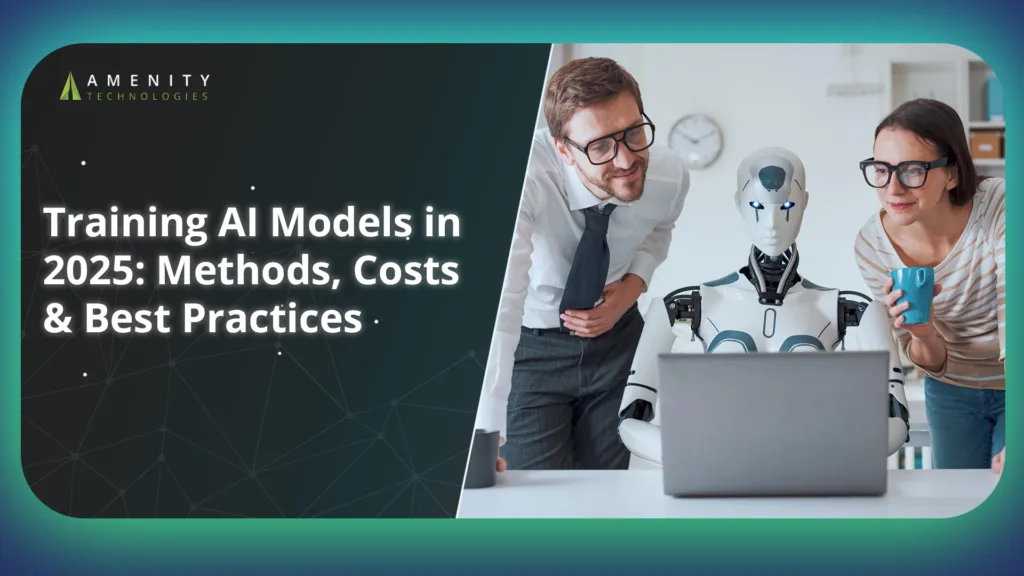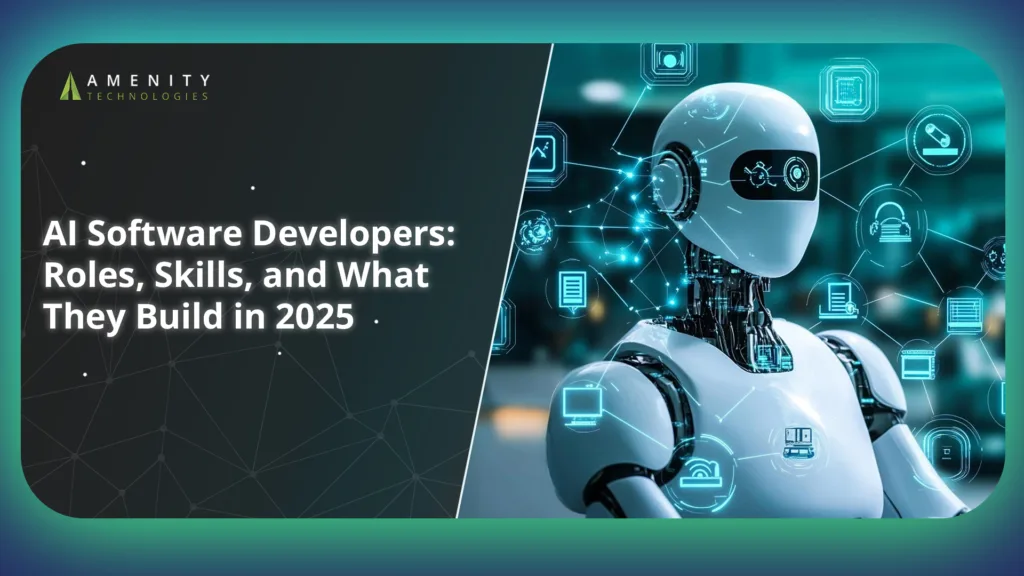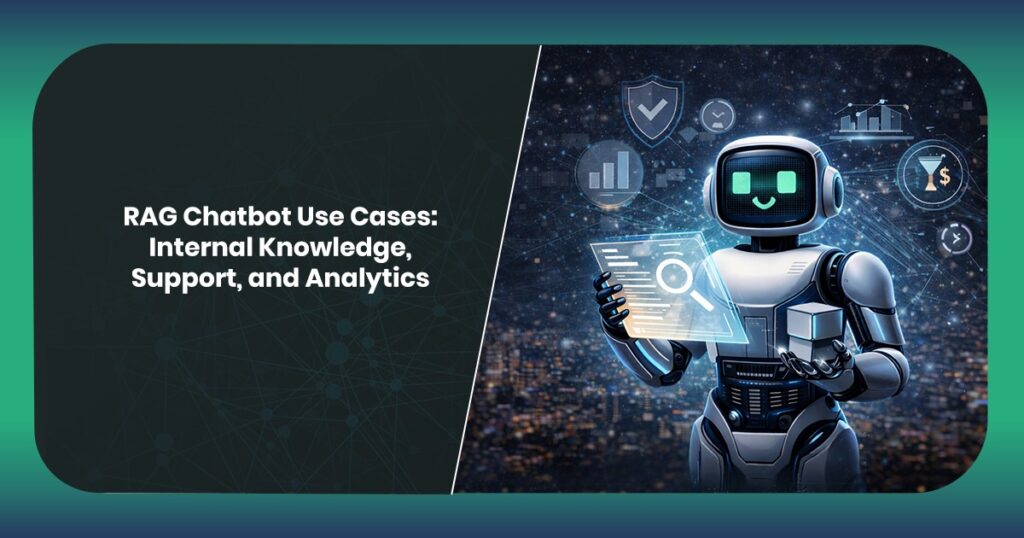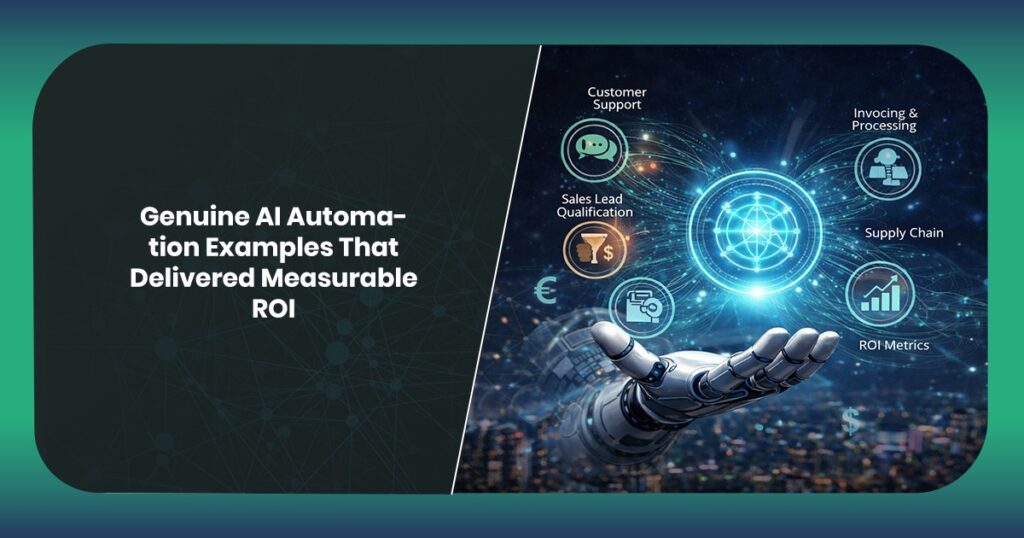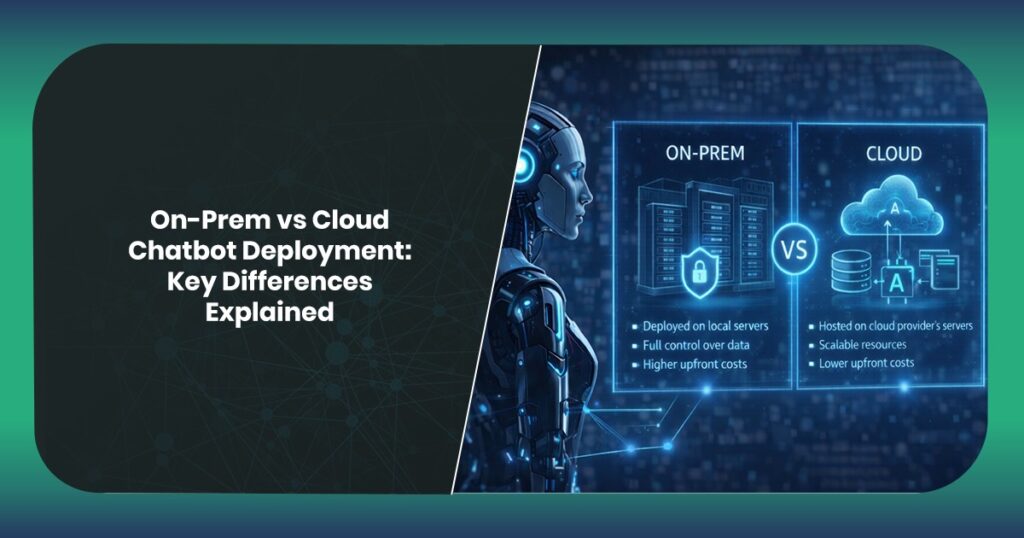Every day, businesses hear about AI transforming industries, but when it comes to actually implementing it, the story gets murky. How much does it cost? What does the process really look like? And most importantly, will it actually deliver results for your company, or is it just another buzzword? If you’ve asked yourself these questions, you’re not alone.
Global spend on artificial intelligence is on pace to reach $294 billion in 2025, up from $233 billion in 2024, with a projected CAGR of 29.2% through 2032. Besides, 75% of executives are concerned that failure to implement AI might lead to closure of their business activities within the next five years.
It is high-time for businesses across industries to adopt and integrate AI into one of their workflows to accelerate the speed and deliver high-quality results. If you don’t have an idea, how to get started, then AI development consultants can help you.
However, for that, you need some ideas. This blog breaks down workflows, budgets, and vendor types, whether you’re building gen AI apps, embedding AI backend integration, or exploring LLM applications, so you can pick the most practical path.
What do AI Development Services Entail?
Companies investing in AI need clarity on the scope of AI development services. Services now extend beyond coding models to include strategy, architecture, integration, and ongoing support.
Businesses often expect vendors to manage every step from initial consultation to deployment and monitoring.
The goal is a functional system that scales efficiently, whether building a gen AI app prototype, integrating AI backend integration into existing platforms, or deploying LLM applications for specific workflows. Understanding deliverables and processes helps set realistic expectations and ensures investment aligns with business goals.
What services do AI development service providers offer?
- AI development services now cover planning, feasibility analysis, and defining data readiness.
- Vendors provide consultants to identify high-value use cases, design models, and create integration plans.
- Services also include architecture setup, compliance review, infrastructure provisioning, and production deployment.
This approach supports both custom AI service providers and businesses using scalable AI platforms to ensure AI initiatives are operational and maintainable.
What are the typical deliverables that one can expect?
- Deliverables range from proof-of-concept or MVP systems to full production AI.
- Clients receive custom AI tools, models with AI backend integration, and documentation for ongoing operations.
- Maintenance includes monitoring, retraining, and updates.
Vendors often provide support for NLP and vision services, deep learning service providers, and AI engineers to ensure smooth operation and continuous improvement across applications.
Here’s a table that maps what deliverables businesses can expect from a particular AI development service:
| Services | Key Deliverables |
| Strategy & Planning | Use-case definition, feasibility analysis, AI roadmap, data readiness assessment |
| AI Model Design | Prototype/MVP models, gen AI apps, custom AI tools, LLM applications |
| Integration & Deployment | AI backend integration, production deployment, infrastructure setup, compliance checks |
| Monitoring & Maintenance | Model retraining, performance tracking, updates, support from AI engineers |
| Consulting | Guidance from AI consultants, workflow optimization, technology recommendations |
Expected Workflow for AI Application Development Services
Understanding the workflow helps businesses anticipate effort, cost, and timelines for AI application development services. A structured approach ensures projects deliver measurable results without surprises.
Vendors typically follow four stages: discovery, prototyping, scaling, and ongoing monitoring. Each stage involves specialized expertise, from AI consultants defining use cases to AI engineers handling AI backend integration.
Whether launching gen AI apps, implementing LLM applications, or developing custom AI tools, knowing the workflow clarifies responsibilities, deliverables, and investment.
Phase 1. Discovery & Strategy – Defining Use Cases & Data Readiness
Vendors assess existing data, infrastructure, and workflows to identify high-value use cases. AI consultants recommend strategies, data preparation, and feasibility for AI application development services before prototyping begins.
Phase 2. Prototype & MVP – Quick Wins with Gen AI Apps or Custom AI Tools
Teams build gen AI apps or custom AI tools to validate assumptions quickly. Early prototypes help stakeholders measure value, gather feedback, and adjust scope before full-scale deployment.
Phase 3. Scale & Production – AI Backend Integration, Deployment on Scalable AI Platforms, LLM Applications
After validation, solutions integrate with backends, deploy on scalable AI platforms, and expand to LLM applications. Production-ready models are optimized for performance, reliability, and future growth.
Phase 4. Ongoing Monitoring – Retraining, Performance Metrics, ROI Tracking
Post-deployment includes monitoring model accuracy, retraining, tracking ROI, and adjusting AI backend integration or models as needed.
AI Development Services Cost Breakdown
Pricing for AI development services varies by complexity, scope, and technology used. Businesses can estimate costs based on project type and scale.
- Simple PoCs
Estimated Cost: $10K–$50K
Basic prototypes or rule-based models allow small-scale validation without large investments.
- Gen AI MVPs
Estimated Cost:$50K–$150K
Includes lightweight Gen AI apps or integrations with existing systems.
- Mid-Level ML/NLP Projects
Estimated Cost: $60K–$250K
Data-intensive solutions requiring model tuning and testing, often with AI engineers involved.
- Enterprise AI Systems
Estimated Cost: $150K–$1M+
Full-scale deployments with LLM applications, AI backend integration, and enterprise-level support.
The key cost drivers include:
- Infrastructure: Cloud compute, storage, and GPU resources can vary significantly based on the scale of models, frequency of training, and deployment needs.
- Data Collection and Labelling: High-quality data acquisition and labeling is important. Costs can arise from collecting raw datasets, cleaning, annotating, and maintaining data pipelines. Specialized labeling for NLP, vision, or domain-specific datasets can add substantially.
- Skilled Talent: Specialized talent, besides, talent shortages in key regions like the US, EU, and Middle East can increase rates.
- Compliance and Industry Expertise: Industry-specific compliance and expertise, especially in sectors like healthcare and finance.
- Licensing: Using proprietary frameworks, LLMs, or AI development platforms can incur licensing fees, API costs, or subscription charges.
- Monitoring and Maintenance: Post-deployment costs include retraining models, monitoring performance, updating software, and scaling infrastructure as usage grows.
Understanding these components helps plan budgets accurately and align expectations with vendors.
How AI Development Services Differ by Project Type?
Choosing the right AI approach depends on your goals, resources, and timelines. AI development services cover multiple project types, each with unique focus areas and deliverables.
Understanding the differences helps businesses plan budgets, allocate talent, and set realistic expectations. Some projects prioritize speed and early results, while others require complex model tuning or fully bespoke systems.
Before selecting a vendor, it’s essential to know what each project type entails and how it aligns with business objectives.
1. Gen AI Apps
Gen AI apps focus on rapid deployment using pre-trained models. These solutions allow businesses to quickly test concepts, automate routine tasks, or build simple prototypes. They require less development time compared to fully custom systems and are ideal for early validation without a large initial investment.
2. ML/NLP Solutions
ML/NLP solutions handle larger datasets and need precise tuning for accuracy. These projects often require experienced AI engineers to train, test, and validate models. They are suited for businesses aiming to implement data-driven decision systems or advanced language and vision capabilities, with moderate-to-high development effort.
3. Custom AI Tools
Custom AI tools are fully bespoke solutions built to meet specific business workflows. Developed by custom AI service providers, these projects involve longer timelines, deeper collaboration, and higher budgets. They are suitable for unique processes or industry-specific needs where off-the-shelf models are insufficient.
4. AI Integration Services
AI integration services focus on embedding AI into existing applications and systems. This ensures smooth operation, scalability, and reliability without disrupting current workflows. Complexity and timelines vary depending on the architecture of the existing stack and the integration requirements.
Here’s a table that describes all the AI project types, along with their timelines and key deliverables:
| Project Type | Timeline | Key Deliverables |
| Gen AI Apps | 4-8 weeks | Pre-trained model prototypes, gen AI apps, quick automation solutions |
| ML/NLP Solutions | 2-10 months | Tuned ML/NLP models, validated datasets, performance reports |
| Custom AI Tools | 3-12 months | Fully bespoke custom AI tools, integration pipelines, documentation |
| AI Integration Services | 1-4 months | Embedded AI in existing stacks, AI backend integration, scalability setup |
Why Amenity Technologies is the AI Development Company You’ve Been Searching For?
Businesses need a partner that combines technical depth with clear delivery and cost models. Amenity Technologies is your comprehensive AI development service partner across project types, from gen AI apps and custom AI tools to AI integration services.
Transparent pricing and tiered engagement ensure clients know exactly what they are investing in, whether it’s a small MVP or an enterprise-grade LLM application. Industry-specific knowledge allows rapid deployment across sectors like healthcare, finance, and enterprise systems, helping businesses achieve measurable AI outcomes efficiently.
1. Full-Spectrum Expertise
We deliver expertise across Gen AI apps, NLP, computer vision, and custom AI tools. Our team designs, develops, and integrates solutions that align with client workflows and objectives.
2. End-to-End Delivery
We manage the full development lifecycle. From initial ideation and prototyping to AI model deployment, system integration, and ongoing maintenance, our approach ensures solutions are reliable and scalable.
3. Expertise & Efficiency
Our in-house team of AI engineers, deep learning service providers, and NLP and vision services experts ensures technical excellence, reducing dependency on external vendors and streamlining delivery.
4. Transparent Cost Models
We provide clear pricing models aligned with project complexity, from small MVPs to enterprise-grade solutions, ensuring clients understand investment and ROI expectations upfront.
5. Domain-Aligned Solutions
We have experience in healthcare, finance, and enterprise systems, enabling rapid deployment with compliance and scalability in mind. Solutions are tailored to operational and industry-specific requirements.
Conclusion
AI development services in 2025 cover a wide spectrum, from small proof of concepts to enterprise-scale LLM applications and custom AI tools. Costs vary from $10K prototypes to projects exceeding $500K, depending on complexity, infrastructure, and domain requirements.
Selecting vendors with transparent workflows, experienced AI engineers, and expertise in Gen AI apps or AI backend integration ensures effective deployment. Amenity Technologies delivers end-to-end solutions with scalable systems and cost-aligned approaches, helping businesses implement reliable AI while controlling investment and achieving measurable outcomes. Share your AI vision with our experts today, and we will build a solid strategy to execute your vision.
FAQs
Q1. What differentiates AI application development services from general software development?
AI application development services focus on building, training, and deploying models, integrating AI backend integration, and monitoring performance. Unlike standard software, these projects handle data modeling, ML/NLP pipelines, and Gen AI apps, providing predictive or generative capabilities beyond typical application logic.
Q2. Are there lower-cost options for getting started with AI services?
Yes. Small projects or MVPs often start at $10K–$50K. Early-stage Gen AI apps or simple custom AI tools allow businesses to validate concepts without major infrastructure or development costs, making AI development services accessible for smaller teams.
Q3. How long does an AI development engagement typically take?
A proof-of-concept can be completed in 4–8 weeks, while full-scale AI application development services involving LLM applications or AI backend integration usually take 6–12 months. Timelines vary depending on complexity, data availability, and integration requirements.
Q4. What ongoing costs follow initial deployment?
Maintenance typically adds 15-25% of the initial budget. Costs include model retraining, system monitoring, infrastructure scaling, and updates. Vendors providing AI engineers or deep learning service providers support long-term performance and ROI tracking.
Q5. Can small businesses afford AI development services?
Yes. Modular approaches and scaled MVPs allow small businesses to access AI development services. Using custom AI service providers for targeted Gen AI apps or automation reduces upfront costs while delivering measurable results.
Q6. How to pick the right service provider?
Choose vendors offering transparency, domain expertise, and experience with LLM applications, AI backend integration, and scalable AI platforms. Consultative workflows and proven delivery of Gen AI apps or custom AI tools ensure alignment with business goals.






